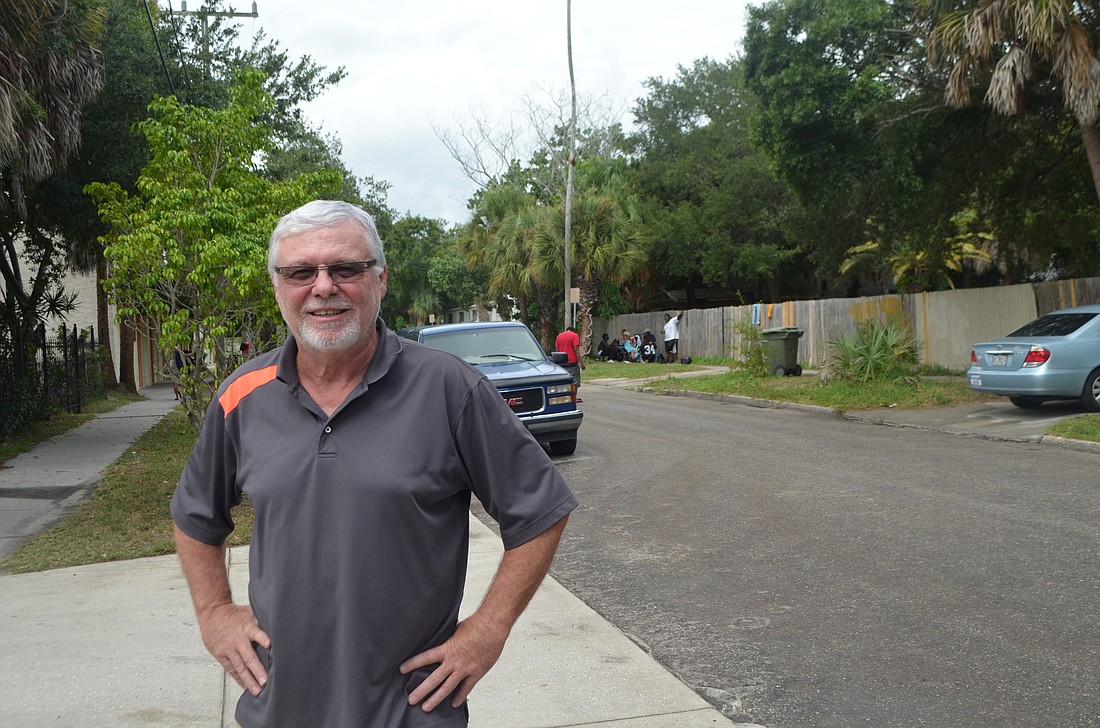- April 24, 2024
-
-
Loading

Loading

After half a year of talk eagerly anticipating the imminent revitalization of the Rosemary District, the neighborhood was dealt a shocking blow Monday when Darwin Santa Maria announced the closing of his award-winning restaurant, Darwin’s on 4th.
Although the Peruvian restaurant’s departure doesn’t erode recent progress made in the area — including plans for several residential projects — it came as a surprise for Rosemary District businesses. Perhaps making matters worse, in a Facebook post announcing the closure, Santa Maria attributed the decision to a longstanding problem in the neighborhood.
Santa Maria cited the Rosemary District’s ongoing homelessness issue and its effect on business as a primary reason for the closure. A gathering of homeless individuals often assembled on Kumquat Court, adjacent to the Darwin’s parking lot. Santa Maria had been vocal about the need to address the issue, and worked to hire homeless individuals for work around the restaurant earlier this year.
"Everyone is complaining, and nobody is finding a solution to what we can do." — Darwin Santa Maria
In an interview with the Sarasota Observer earlier this year, Santa Maria said the homeless problem had gotten worse over the second half of 2014. He was one of several businesses and residents in the area who called for city leaders to take action to address the issues.
"Nobody’s really paying attention to this problem," Santa Maria said at the time. "Everyone is complaining, and nobody is finding a solution to what we can do."
The city has since approved an eight-point plan to address homelessness and hired a coordinator charged with overseeing that plan.
Bill Cornelius, owner of the building and Santa Maria’s business partner since the restaurant opened in 2012, described the closure as a joint decision made about a week ago. Although he, too, has taken note of a homelessness problem within the Rosemary District, he said there were a number of contributing factors behind the decision to close — including payroll expenses in the upscale restaurant.
"We always tried our best to have the highest level of quality," Cornelius said. "There were a lot of experienced cooks on staff helping him. Those labor costs can be sustainable when the restaurant is full, but when you factor in the well-known homelessness problem in the area, it becomes troublesome."
In a business district that’s struggled to revitalize in recent years, he said losing Darwin’s on 4th is unfortunate, but he’s already thinking about the next occupant on the block that’s also home to Blue Rooster and Station 400.
"I’d like to find a new tenant — potentially a well established restaurateur in Sarasota to come in and help keep the Rosemary District alive," Cornelius said. "It’s a beautiful space, and it’s one of the nicest kitchens in town. This is such a beautiful area, and I want to see it continue to move in a good direction."
Although it’s a change in momentum following the 2014 approval of the Rosemary Residential Overlay District, Darwin’s isn’t the first business in the area to close its doors and cite problems with the neighborhood. In 2013, Derek’s Culinary Casual closed its Central Avenue location and relocated to Bradenton, blaming the lack of redevelopment in the Rosemary District. Santa Maria also opened Darwin’s Brewing Co. in Bradenton, not Sarasota, citing problems with city zoning regulations concerning breweries.
Cornelius believes Sarasota could be an attractive destination, but believes the activity — or inactivity — of the government is holding it back in certain areas.
"It’s exasperating," Cornelius said.
Still, thanks in part to the Rosemary Residential Overlay District’s density bonus, the neighborhood is anticipating a building boom. That, combined with the success of nearby Citrus Square, has Cornelius still optimistic about the future of the area — as long as the city eventually works on the homelessness issue.
"I think with the new apartments and the new commercial building on the corner, we’ll attract more people here, but the homelessness problem needs to be addressed," Cornelius said.
Doug Logan, the city’s new director of special initiatives on chronic homeless, said the restaurant industry is volatile, particularly in seasonal communities, and pointed to Cornelius’ comments about the role labor costs played in the closing. Still, he’s been in contact with Rosemary District businesses and is coordinating city resources — which now includes a second homeless outreach team — to address problems as they crop up.
"We know the problem exists. There’s no denying it." — Doug Logan
In the long term, Logan is working on implementing the city’s new strategy for addressing homelessness, focused on a housing-first approach.
"We know the problem exists; there’s no denying it," Logan said. "We’re trying to deal with it as best we can."
Real estate broker Ian Black, a strong proponent for the revitalization of the Rosemary District, was disappointed by the news. He believes the current status of service providers such as the Resurrection House — located on Kumquat Court — makes matters worse, and any conversation needs to address the management of those entities.
"I think the message to the City Commission, to Resurrection House and everybody else involved is this is a time for change," Black said. "If you provide an alternative for the Resurrection House and they move, that area would take off in 10 seconds."
Like Cornelius, though, Black has similar hopes for the future of the neighborhood as the long push for revitalization continues.
"There’s the initial shock," Black said. "But at the end of the day, it’s a chance for people to come together and provide a solution to these problems."